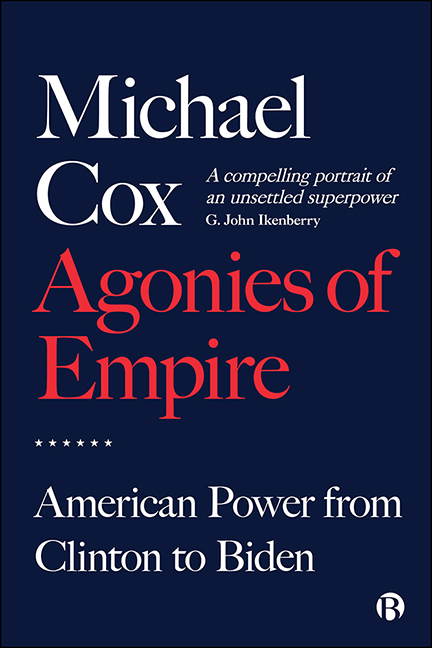Book contents
- Frontmatter
- Dedication
- Contents
- About the Author
- Preface
- Introduction: The Rise of an Empire
- PART I Clinton: Liberal Leviathan
- PART II Bush Jnr: Empire in an Age of Terror
- PART III Obama: Towards a Post-American World?
- PART IV Trump: Turbulence in the Age of Populism
- PART V Biden: Is America Back?
- Notes and References
- Acknowledgements
- Index
1 - From Geopolitics to Geo-Economics?
Published online by Cambridge University Press: 15 September 2022
- Frontmatter
- Dedication
- Contents
- About the Author
- Preface
- Introduction: The Rise of an Empire
- PART I Clinton: Liberal Leviathan
- PART II Bush Jnr: Empire in an Age of Terror
- PART III Obama: Towards a Post-American World?
- PART IV Trump: Turbulence in the Age of Populism
- PART V Biden: Is America Back?
- Notes and References
- Acknowledgements
- Index
Summary
Ask not what your country can do for you, ask what exporting can do for your country and you.
One of the observations repeatedly made about American foreign policy after the end of the Cold War was that its primary point of reference gradually, but perceptibly, shifted away from a concentration on more traditional security matters to a new agenda, in which the main preoccupation now was less to worry about ‘the Soviet bear in the woods’ and more to focus on how it could compete more effectively in an increasingly globalized economy. Indeed, according to this view, the United States had previously been unable to do so because of the constraints imposed on it by the superpower conflict. As the US Trade Representative Mickey Kantor observed, prior to 1989 the United States had ‘often neglected’ its ‘economic and trading interests because of foreign policy and defense concerns’. But it would no longer be doing so, he argued, and henceforth would be pursuing its material goals without the Cold War compromising its economic interests.
Naturally enough, in this new environment, the rules of what one economist termed the ‘new game’ were bound to change. So too were US needs as it quickly became clear that America's main assets in the new world order were not so much rockets, tanks and warheads, as were its trained workers, educated entrepreneurs and high-tech industries. Moreover, the object of the game now was not to prevent the spread of an alien ideology, but rather to maintain and, where possible, increase market share. This, however, did not make it any the less serious as a contest. For if the United States succeeded in ‘winning’ the economic battle it would mean domestic prosperity and continued influence abroad. But failure could easily lead to decline internationally and rising social tensions at home. The stakes in the post-communist era were every bit as high as they had been during the Cold War itself.
This somewhat oversimplified picture obviously requires some qualification. Military power, after all, did not become completely irrelevant after the end of the Cold War, no more than did the threat posed by the spread of nuclear weapons and what Washington defined as ‘backlash states’.
- Type
- Chapter
- Information
- Agonies of EmpireAmerican Power from Clinton to Biden, pp. 7 - 22Publisher: Bristol University PressPrint publication year: 2022



